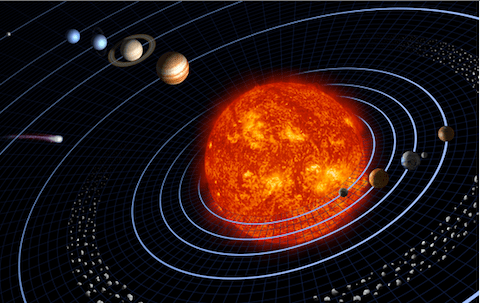Computers Can Help Students Learn Science

Have you ever made a scale model of the solar system – the kind where a frozen pea represents earth and finding Pluto (despite the fact that it’s no longer a planet) requires a small hike? The solar system is full of sizes and distances so much larger than our everyday lives that it’s hard to truly comprehend — and our intuitive ideas are often wrong. (Why is it colder in winter than summer? Hint: it has nothing to do with our distance from the Sun.) Is there a better way to tour the solar system?
A recent study found that even brief use of an educational app called Solar Walk(TM) (for Apple devices) improved students’ understanding of the solar system. Specifically, students who explored the solar system using the iPad’s “pinch-to-zoom” touch screen and Solar Walk’s true-to-scale solar system (as opposed to “traditional” orrery models of the solar system that exaggerate scale) were more successful in addressing their misconceptions about the solar system than students who used “traditional” models.
152 students from a public high school in Massachusetts were each supplied by the school with an iPad loaded with Solar Walk (by Vito Technology). Students had 20 minutes to explore the app on their own, following written instructions. Half the students explored Solar Walk’s “traditional” model of the solar system on the first day and the true-to-scale model on the second day (and vice versa for the other half). Pre- and post-tests measured students’ comprehension of scale and our solar system using questions drawn from the Astronomy and Space Science Concept Inventory, a database of “distractor-driven multiple-choice” test items, which force students to choose between a single correct answer and one or more previously identified misconceptions.
While students in both test groups showed some improvement, the true-to-scale model had a significant impact on students’ understanding of scale in the solar system.
The results are encouraging and could hold promise for aiding instruction of other counter-intuitive subjects such as physics, but that doesn’t mean every school should stampede for the iPads and expect a miracle. A meta-analysis of computer-aided instruction found that technology such as tablet computers aids science education under specific circumstances: computers seem more effective when used individually rather than in groups, in simulation or tutorial mode, when supplemental rather than used for whole lesson delivery, and when focused on specific educational objectives and curriculum goals.
Matthew Schneps from the Harvard-Smithsonian Center for Astrophysics, lead author of the study, summed up their findings: “Our research suggests that not only do these new devices provide a cost effective means for delivering content, but may afford new ways of learning that are otherwise difficult to achieve in the traditional classroom.”






0 Comments
Leave a Comment
Your email address will not be published. All fields are required.